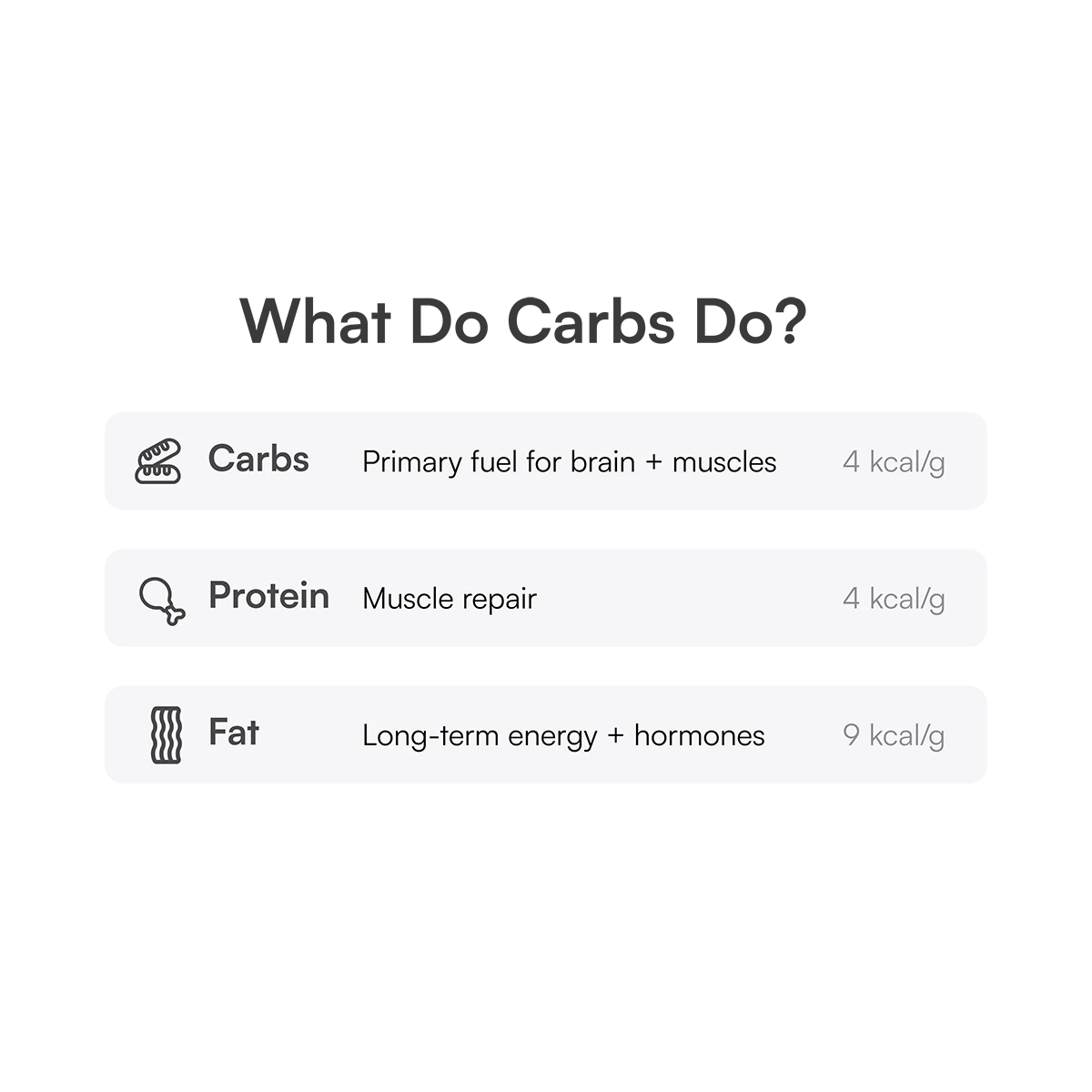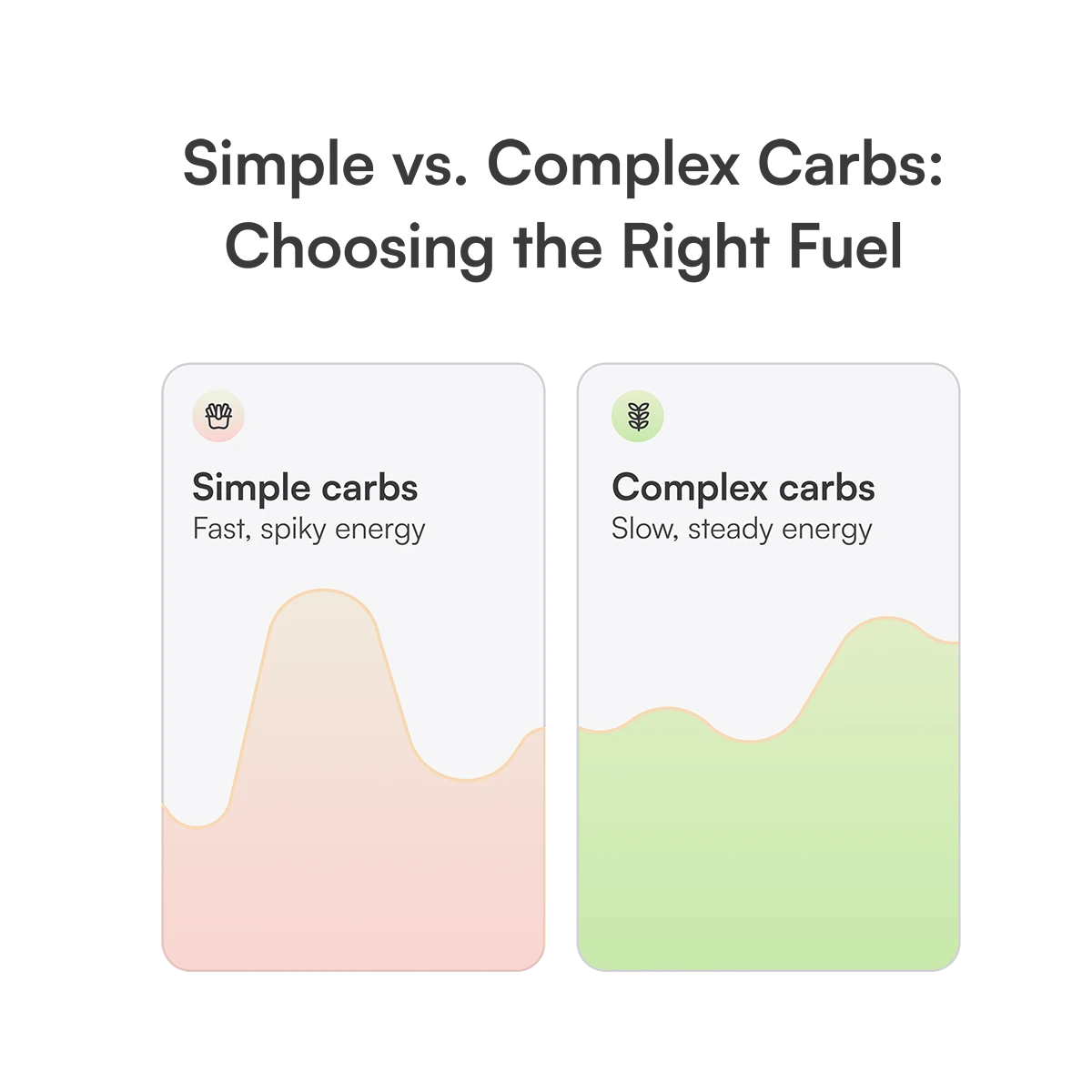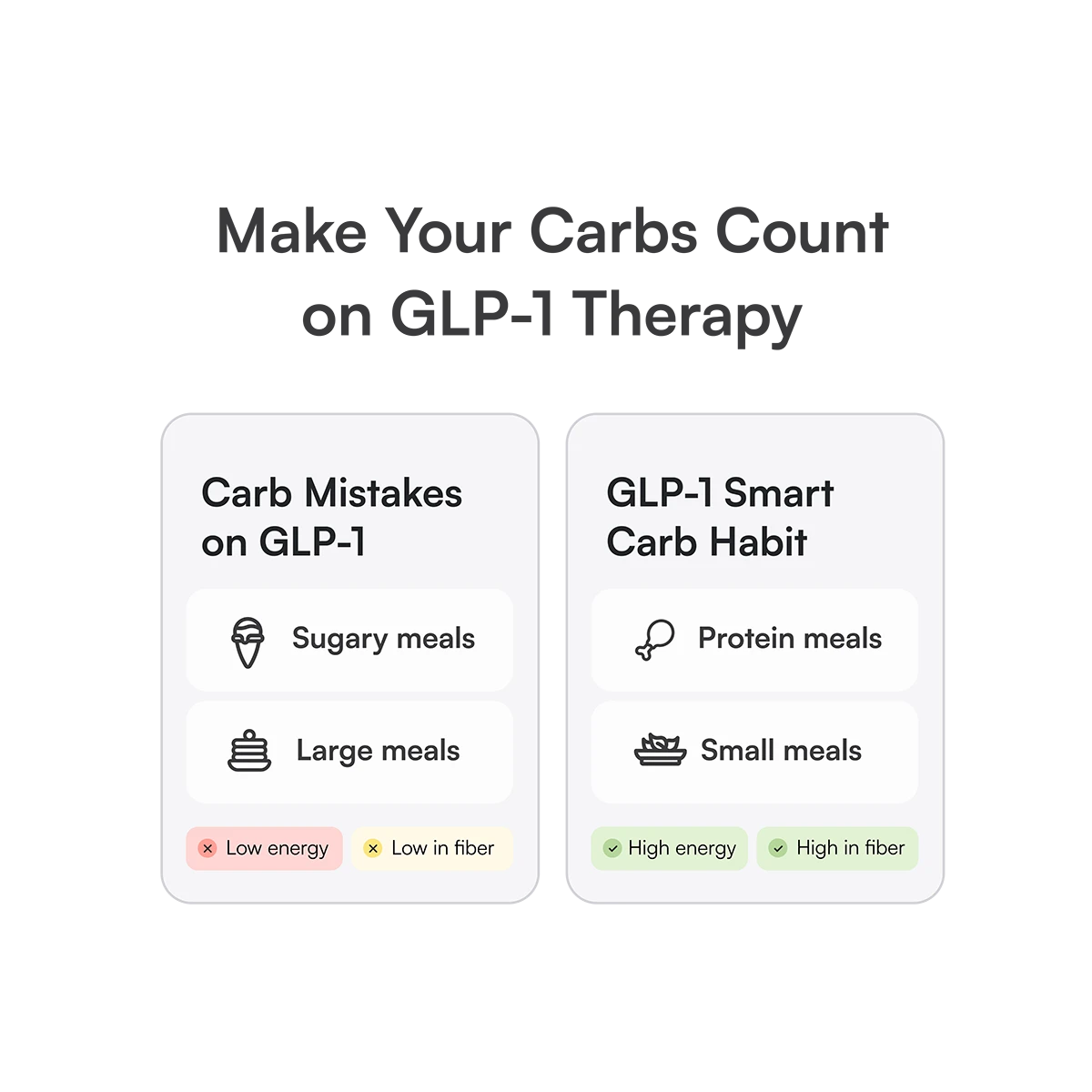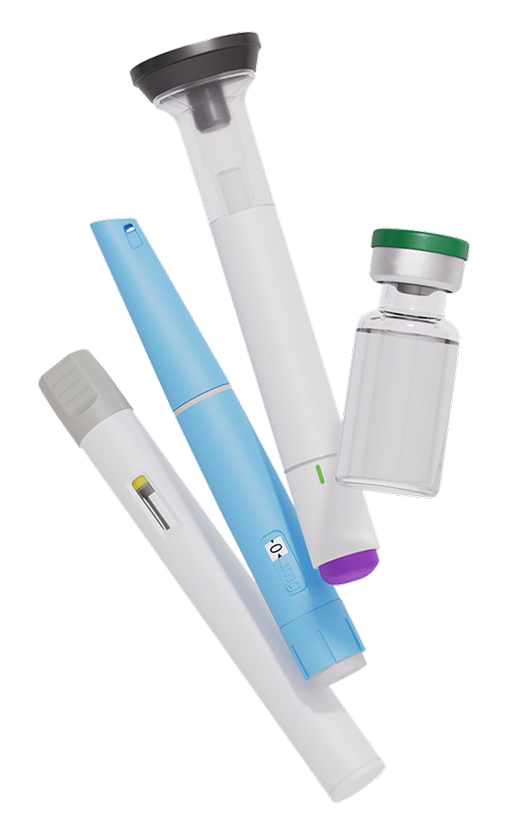Carbohydrates Calculator: Fueling Your Body for Fat Loss, Muscle Gain, and Maintenance
Carbohydrates (carbs) are one of the three major macronutrients (alongside protein and fat) that our bodies use for energy. They often get a bad rap in diet conversations, but carbs are essential fuel for your body’s daily functions and workouts. In this guide, we’ll explore what carbohydrates are, why tracking them can be useful for different fitness goals, how many carbs you might need per day, the difference between simple and complex carbs, tips for timing your carb intake, and special considerations for individuals using GLP-1 medications. By the end, you’ll understand how to use Eden’s free Carbohydrates Calculator as an educational tool to fine-tune your carb intake – whether you’re aiming to lose fat, build muscle, or maintain your weight. (Disclaimer: This article as well as the carbohydrates calculator is intended for informational and educational purposes only. The results are an estimate and are not intended to be a substitute for professional medical advice, diagnosis, or treatment.)
What Are Carbohydrates and Why Do We Need Them?
Carbohydrates are molecules found in a wide variety of foods, and they are the body’s primary source of energy. When you eat carbs, your digestive system breaks them down into glucose (blood sugar), which is then used to fuel your cells, tissues, and organs – especially your muscles during activity and your brain during mental tasks. Any glucose that isn’t needed immediately can be stored in your liver and muscles as glycogen for later use, or converted to fat if you consume more than you burn.

Carbs provide 4 calories per gram of energy, making them an efficient fuel source for exercise and daily living. Beyond energy, carbohydrate-containing foods often come packed with important nutrients. Fruits, vegetables, legumes, and whole grains (all rich in carbs) contain vitamins, minerals, dietary fiber, and antioxidants that support overall health. In fact, many carb-rich foods contribute to heart health and digestive health – for example, fiber from whole grains and veggies helps you feel full and supports healthy digestion. Because of this, even when you’re pursuing weight loss, completely eliminating carbs is not advisable. As Cleveland Clinic dietitian Annalise Pratt explains, “Carbs have a bad rap. But even for weight loss, you still don’t want to eliminate all of them. Many contain fiber and other nutrients that are good for you”.
In short, carbohydrates are not “enemy” foods – they are a fundamental part of a balanced diet. The key is understanding the right types and amounts of carbs to consume for your specific goals. That’s where carb tracking and Eden’s Carb Calculator can help.
Why Track Carbs? Carbohydrates and Your Fitness Goals
Tracking your carbohydrate intake can be a useful strategy to ensure you’re getting the right amount and type of fuel for your goals. Carbs can have different impacts on your body composition and performance depending on how much you eat and how active you are. Here’s how carbohydrates relate to three common goals – weight loss, weight maintenance, and muscle gain – and why paying attention to carbs is important for each:
Carbs for Weight Loss
If fat loss is your goal, moderating your carb intake can help control your overall calorie consumption and stabilize your blood sugar and energy levels. Weight loss ultimately requires a calorie deficit – burning more calories than you eat – and since carbs make up a significant portion of most people’s diets, reducing high-calorie, low-nutrient carbs (like sugary treats and refined grains) is a common strategy to reduce calories. Many people find that cutting back on excessive sugars and starches and focusing on fiber-rich carbs helps prevent the rapid blood sugar spikes and crashes that trigger hunger and cravings. For example, consuming whole grains and non-starchy vegetables has been associated with better weight control, whereas diets high in refined grains and sugary foods are linked to weight gain over time. By tracking carbs, you can ensure you aren’t unknowingly consuming lots of “empty” carb calories that could hinder your deficit and progress.
That said, carbs are still important when losing weight – you don’t want to cut them to extremes. Extremely low-carb diets (like keto) can work for some, but they aren’t necessary for everyone and can cause fatigue or nutrient shortfalls if done improperly. In fact, your brain alone requires about 130 grams of glucose per day to function optimally, which is why the Institute of Medicine recommends 130 g/day as a minimum carb intake for adults. Many dietitians suggest a moderate reduction instead of an ultra-low approach. Annalise Pratt, RD, notes that around 100–150 grams of carbohydrates per day is a safe amount for most people who are trying to lose weight. This range allows for plenty of vegetables, some fruit, and whole grains so you get enough fiber and nutrients, while still cutting back significantly on sugars and refined carbs.
Tracking your carbs can also help you distribute them wisely through the day for weight loss. Some people find they feel best eating carbs consistently across smaller meals (e.g. ~40–50 g per meal) to keep energy steady. Others might front-load carbs earlier in the day when they are more active and taper off at dinner – for instance, having oatmeal and fruit in the morning and a lighter, veggie-heavy meal at night. Either approach can work; the goal is to avoid extreme swings and excessive portions. By monitoring your carb intake, you can experiment and find the balance that keeps you full, energized, and losing fat at a sustainable pace.
Of course, requirement of carbs may differ from individual to individual based on your health profile - it is important to consult with a licensed provider to determine best needs for your health profile.
Carbs for Weight Maintenance
For maintaining your weight and overall health, the focus is on balance and quality of carbs. Once you’ve reached a healthy weight, you’ll likely be eating at a calorie balance (maintenance level), and carbs will comprise a significant portion of those calories. The general guideline for healthy adults is to get roughly 45% to 65% of your daily calories from carbohydrates. This typically equates to about 225–325 grams of carbs per day on a 2,000-calorie diet. At maintenance, you’re not trying to create a deficit or surplus, so tracking carbs is more about making sure you’re neither overloading on sugars nor dipping too low and feeling lethargic.
A balanced maintenance diet means including complex carbohydrate sources like whole grains, fruits, vegetables, and legumes at each meal to provide steady energy and sufficient fiber. These types of carbs digest slowly and help keep your blood sugar stable and your hunger in check. By tracking, you might notice if you’re eating too many refined carbs (which could lead to weight creep or poor blood markers) and adjust by swapping in more whole-food carbs.
Another reason to pay attention to carbs in maintenance is to support your activity level. If you pick up a new exercise routine or have an especially active day, ensuring you eat enough carbs can prevent energy crashes. Conversely, on a very low-activity day, you might naturally eat a bit fewer carbs. Tracking helps you tune into these fluctuations. Ultimately, for weight maintenance, consistency is key – keeping your carb intake in a moderate range and focusing on quality will help you maintain your results and feel good day-to-day.
Carbs for Muscle Gain and Performance
When the goal is to build muscle, gain weight, or support intense training, carbohydrates become even more crucial as your primary fuel. Muscle growth requires a calorie surplus for most people, and plenty of carbs are needed to both fuel your workouts and spare protein for muscle repair. In other words, if you don’t eat enough carbs, your body may start using protein (or muscle tissue) for energy, undermining your muscle-building efforts. As sports dietitian Amy Stephens, RDN, puts it: “Consuming enough carbs prevents the body from using protein for energy, allowing protein to focus on building and repairing tissues”.
Active individuals and athletes need significantly more carbohydrates. Carbs are the preferred fuel for moderate to high-intensity exercise, from weightlifting to running. If you’re training hard most days, you’ll want to eat on the higher end of the carb range (or beyond). For example, a person exercising about an hour a day with the aim of building muscle might consume 5–7 grams of carbs per kilogram of body weight. For a 150 lb individual (~68 kg), that’s roughly 340–475 grams of carbs per day to support muscle growth and recovery. These carbs fill up your muscle glycogen stores, which are tapped during heavy workouts, and provide the energy to maximize training intensity and volume. In fact, if you try to lift or sprint without adequate carb stores, you’ll likely fatigue faster and perform worse. Over time, that can translate to fewer gains.
Tracking carbs while bulking or training for performance ensures you’re getting enough to meet your increased needs. Many muscle-building nutrition plans keep carbs at around 40–50% (or more) of total calories. As one illustration, Bodybuilding.com’s macro recommendations for muscle gain use about 40% of calories from carbs (with higher overall calories), which still results in a higher gram amount of carbs than a weight-loss diet because the total intake is increased. The bottom line is that carbs are an ally for muscle building: they not only provide workout energy but also trigger insulin, a hormone that helps shuttle nutrients into muscles. By tracking, you can verify that you’re eating sufficient carbs each day to keep your training powered and your muscles growing.
The Importance of Carb Quality
Across all goals – loss, gain, or maintenance – it’s important to emphasize that the quality of the carbs you eat matters. Regardless of quantity, choosing mostly nutrient-dense, high-fiber carbohydrate sources will benefit your health and goal attainment. Diets high in refined sugars and low-quality carbs tend to promote fat gain and health issues, whereas diets rich in whole-food carbs support better weight management and wellness. One large cohort study found that increasing intake of “low-quality carbs” (like sugary drinks, white bread, white rice, etc.) was associated with weight gain over several years, while even a small increase in fiber intake was linked to significantly less weight gain.
So, while tracking carbs, take note not just of the grams but of the sources. Are most of your carbs coming from vegetables, fruits, oats, brown rice, quinoa, sweet potatoes, beans, and other whole foods? If so, you’re likely getting a good balance of fiber and micronutrients along with your carbs. If you notice a lot of your carbs are coming from things like white bread, sugary snacks, soda, or processed foods, consider swapping those out for complex carbs in your next grocery trip. Not only will this help with body composition, but it also supports your long-term health (for example, diets high in added sugars can raise triglycerides and risk heart issues). In summary: carb quality + quantity together determine the impact on your goals. Eden’s Carb Calculator can help with quantity, but you’ll want to choose wholesome carb sources on your own plate.
How Many Carbs Should You Eat Per Day?
Everyone’s ideal carb intake is a little different, based on factors like total calorie needs, activity level, and how their body responds to carbs. However, we can look at some general daily carbohydrate recommendations for various scenarios. Remember, these numbers are estimates – use them as starting points and adjust to what feels right for your body:
- General Health (Maintenance): For a healthy adult maintaining weight, 45–65% of calories from carbs is the standard guideline. If you eat around 2,000 calories a day, that’s about 225–325 grams of carbs daily. This level ensures you have ample energy and nutrients. Many people settle around the mid-point (~50% of calories as carbs) for a balanced diet.
- Weight Loss: When aiming to lose weight, you might target the lower end of the range or slightly below. A common approach is around 40–50% of calories from carbs (with protein and healthy fats making up the rest), though some go even lower. For many people, this might mean roughly 100–150 grams of carbs per day while in a calorie deficit. This amount is above the minimum needed for your brain (130 g) but likely less than you were eating before. It helps trigger fat-burning while still giving you some carbs for energy and fiber. Very active individuals doing intense exercise while losing weight may need more than 150g to sustain performance – the key is not to drag carbs so low that you feel drained or can’t stick to your plan. Experts also advise that eating at least some carbs consistently throughout the day can prevent energy slumps and overeating later.
- Weight Maintenance: To stay at your current weight, you’ll likely fall around 45–55% carbs depending on personal preference. For example, if your maintenance is 2,500 calories (due to a higher activity level), 50% from carbs would be about 313 g of carbs per day. If your maintenance is 1,600 calories (a smaller person or less active lifestyle), 50% carbs would be about 200 g per day. In practice, maintenance carb needs can vary widely – the key is that your carb intake will scale with your total calorie burn. Tracking for a few weeks when you hit your target weight can help you identify the carb level where your weight stabilizes.
- Muscle Gain/High Activity: To build muscle or fuel lots of exercise, you’ll be eating in a surplus or at high maintenance, with carbs making up a large chunk of those calories. Many muscle gain diets use roughly 50% or more of calories from carbs. Another way to estimate is by body weight: consuming 4–7 grams of carbs per kilogram is often recommended for active people and athletes. If you weigh 75 kg (165 lbs) and are bulking, that could range from about 300 g to 525 g of carbs per day. Endurance athletes might go even higher on very intense training days (sometimes 8–10 g/kg for marathon runners or cyclists during peak training). The exact number depends on how many calories you need to gain weight and how hard you’re training. The main point is, higher activity = higher carb requirements. As long as you’re choosing healthy carb sources, you generally don’t need to fear “too many” carbs in a muscle-building phase – those extra carbs are being put to use in your workouts and recovery. Just monitor that you’re gaining weight at an appropriate rate (e.g. ~0.5–1 lb per week) and adjust carbs up or down slightly if needed.

Keep in mind that these are broad recommendations. The Eden Carbohydrates Calculator can refine the estimate for you by factoring in your personal data (age, weight, activity level, and goal). It provides a quick, anonymous calculation of your daily carb target, which you can then compare against the guidelines above. Use it as a starting framework, and listen to your body’s feedback to fine-tune your intake as well as consult with your licensed healthcare provider. Some people naturally feel better on the higher end of carb range, while others prefer slightly lower – your optimal carb intake is the one that gives you energy, helps you reach your goals, and is sustainable in the long run.
Simple vs. Complex Carbs: Choosing the Right Fuel
Not all carbs are created equal. We can broadly categorize carbs into two types: simple carbohydrates and complex carbohydrates. Understanding the difference can help you make smarter food choices that affect your energy, digestion, and health:
- Simple Carbohydrates – These are sugars made of one or two sugar molecules (think glucose, fructose, sucrose). They are digested very quickly, leading to an immediate release of glucose into the bloodstream. That quick absorption can cause a rapid spike in blood sugar (and insulin), often followed by a crash. Common sources of simple carbs include table sugar, honey, syrups, candy, soda, white bread, and many processed snacks. Fruits and milk also contain simple sugars, but they come packaged with fiber or protein which moderates the effect. Simple carbs are sometimes referred to as “fast” carbs or even “empty calories” when they come from refined sugar, because they provide energy but often lack vitamins, minerals, and fiber. For example, a can of sugary soda might give you a quick energy burst, but it provides virtually no nutritional value and can lead to weight gain if consumed in excess. In general, you want to limit foods high in added simple sugars in your diet (the American Heart Association recommends minimizing refined sugars), as they can contribute to fat gain, cravings, and even elevated triglycerides which impact heart health.
- Complex Carbohydrates – These consist of longer chains of sugar molecules (starches and fibers). They take longer to digest, so they release glucose more gradually into your bloodstream. This slower digestion provides a steadier source of energy without the sharp spikes and crashes. Complex carbs are found in foods like whole grains (brown rice, oats, whole wheat, quinoa, etc.), legumes (beans, lentils, peas), starchy vegetables (potatoes, sweet potatoes, corn), and also in non-starchy veggies and many fruits in the form of fiber. Because complex carb foods are often high in fiber and minimally processed, they tend to be more filling and nutrient-rich. For example, an apple (which contains fiber and complex carbs) will satisfy you longer than a glass of apple juice (mostly simple sugar). The fiber in complex carbs slows down absorption and helps you feel full, so you’re less likely to overeat. Complex carbs also usually come with valuable nutrients intact – B vitamins, antioxidants, etc. – that are stripped away in refined products. For these reasons, complex carbohydrates are generally the better choice for sustained energy and health.

In practical terms, what does this mean for your diet? Prioritize complex carbs over simple carbs most of the time. For instance, choose whole-grain bread or brown rice instead of white bread or white rice to get more fiber and nutrients. Opt for oatmeal with berries instead of a sugary breakfast cereal. Snack on fruit or yogurt instead of candy or pastries. By doing so, you’ll avoid the rollercoaster of blood sugar spikes that simple sugars cause, which in turn helps control hunger and energy levels. Consistently opting for complex carbs can also improve your digestion (thanks to fiber) and lower your risk of chronic diseases like type 2 diabetes and heart disease in the long run.
However, simple carbs aren’t entirely “evil.” There are times when fast-digesting carbs can be useful – particularly around intense exercise. For example, consuming some quick carbs during or right after a workout can rapidly replenish glycogen (muscle energy) and jumpstart recovery. Research shows that high-GI foods or even sugary treats in the post-workout window can help drive nutrients into muscle and aid muscle repair without the same risk of fat gain, because your muscles are primed to soak up glucose at that time. That’s why you might see endurance athletes use gels or sports drinks (simple carbs) during races, or bodybuilders have a drink with dextrose after lifting – in these situations, the immediate energy is put to good use. So, while your daily meals should be mostly complex carbs, don’t feel guilty if you have a bit of a refined carb strategically around a workout or the occasional treat. Just make sure that for the majority of your carb intake, you’re “spending” it on high-quality sources that nourish your body.
Summary: Complex carbs = slower, steady energy, more nutrition; Simple carbs = quick energy spikes, less nutrition. Emphasize complex carbs in your diet for better energy and health, and use simple carbs sparingly or intentionally (if at all). This approach will improve how you feel on a day-to-day basis – you’ll likely notice more even energy and less sudden hunger when you switch refined carbs for whole-food options.
Planning Your Daily Carb Intake: Timing and Tips
Knowing how many carbs to eat is one thing; figuring out how to spread them throughout the day is another. Smart carb timing can enhance your energy management, workout performance, and even weight control. Here are some tips on planning your daily carb intake:
- Spread Your Carbs Through the Day: Rather than eating one or two very large carb-heavy meals, it’s often better to distribute carbohydrates across your meals and snacks. Consuming moderate amounts of carbs at regular intervals helps maintain stable blood sugar and consistent energy levels. For example, if you aim for ~180 grams of carbs a day, you might have ~45–60 g at three meals and a couple of 15–30 g snacks. This prevents the post-meal sleepiness that can come from a huge carb load and wards off extreme hunger that can lead to overeating. Many people find that about 40–50 g of carbs per meal (roughly the amount in two slices of whole-grain bread plus an apple, for instance) is a sweet spot for feeling satisfied but not sluggish. Adjust portions up or down based on your needs, but aim for a balance – each meal should have some protein and fat along with carbs, rather than being all carbs at once.
- Fuel Up Before Exercise: If you plan to work out, especially in the morning or mid-day, make sure to have some carbs beforehand. Carbs are your muscles’ preferred fuel for moderate to high intensity exercise. Eating a small carb-rich snack ~30–60 minutes before a workout can provide a boost of energy and improve your performance. Good pre-workout options include a banana, a slice of toast with a little peanut butter, Greek yogurt with a bit of fruit, or even a traditional sports drink for those doing intense training. Keep the portion light (20–40 g of easily digestible carbs) so it doesn’t upset your stomach. You’ll likely notice that you can exercise harder and feel better during your session with a bit of carbs in your system – this means more calories burned or more weight lifted, which supports your goals.
- Recharge After Exercise: Post-workout nutrition is also key. After you finish training, your body is primed to replenish the glycogen you used and to repair muscle tissue. Consuming carbs along with protein in the post-workout period (within about an hour) can accelerate recovery. A common guideline is a 2:1 or 3:1 ratio of carbs to protein after workouts, depending on intensity. For example, you might have 50 g of carbs with 20 g of protein. This could be a smoothie with fruit (carbs) and protein powder, chocolate milk (which naturally has roughly a 3:1 carb:protein ratio), or a sandwich with lean meat and whole-grain bread. The carbs will help drive amino acids into your muscles by stimulating insulin, replenishing your energy stores so you’re ready for your next workout. If muscle gain is a goal, don’t skip carbs after training – this is the time they are least likely to be stored as fat and most likely to be used for good.
- Pair Carbs with Protein or Fat: Whenever possible, eat carbs as part of a balanced meal with protein, healthy fats, or fiber. This combination slows down the digestion of the carbs and leads to more stable blood sugar. For instance, if you’re having an apple (carb), also have a few almonds (fat) or a string cheese (protein). If you’re eating rice, have it with chicken breast and broccoli. Such pairings not only improve nutrient balance but also keep you fuller longer. Health experts note that adding protein or fat blunts the blood sugar spike from carbs and provides a more sustained energy release. This strategy is especially useful for those who experience energy crashes or are managing their blood sugar. A side benefit: protein and fat add flavors and textures that make meals more satisfying, which can prevent feelings of deprivation on a diet.
- Time Carbs Around Your Day’s Demands: Think about when you most need energy or focus, and allocate a bit more of your carbs to those times. Many people find that eating a higher-carb breakfast or lunch (when you have a busy morning or afternoon) helps with concentration and physical energy, whereas a lighter-carb dinner is fine if you’re winding down for the evening. One approach is to have complex carbs in the earlier part of the day and around workouts, and then go easier on carbs at night. That said, there is nothing inherently fattening about eating carbs after 6pm – this is a myth. In fact, one study even suggested that eating the bulk of your carbs at dinner can be compatible with fat loss and might aid hunger hormones for some individuals. So, if you prefer a carb-rich dinner (like pasta or rice) and it fits your calorie goals, that’s perfectly okay. The main principle is to align carb intake with activity: eat carbs when you need them for fuel, reduce when you don’t. For example, on a rest day with little activity, you might naturally eat a bit fewer carbs than on a training day – and that’s fine.
- Include Fiber and Stay Hydrated: When planning carbs, remember that fiber is your friend. High-fiber carbs (vegetables, berries, beans, whole grains) not only aid digestion but also increase satiety, so you’re less likely to overeat total calories. Aim to get the recommended ~25–30 grams of fiber per day (or more if you can tolerate it) from your carb choices. For instance, if you have oatmeal for breakfast (soluble fiber) and brown rice or sweet potato with dinner (insoluble fiber), plus fruits and veggies throughout the day, you’ll likely hit your fiber target. Also, drink plenty of water, especially when eating high-fiber carbs. Fiber absorbs water and helps things move smoothly in your gut. Adequate hydration also ensures that the carbs are metabolized efficiently and can help prevent any constipation that sometimes occurs when increasing fiber intake. A good general goal is 8+ glasses of water per day, or more if you’re active.
By applying these timing strategies, you can really get the most “bang for your buck” from the carbs you eat. You’ll use them to power through your workouts, keep your brain sharp at work or school, and avoid those mid-afternoon slumps. It’s all about eating the right carbs at the right times. And remember, consistency wins – a single high-carb or low-carb meal won’t make or break your diet, but patterns over time will. So plan your carb intake in a way that you can stick with and that enhances your lifestyle, rather than fights against it.
Carb Considerations for GLP-1 Users (Ozempic, Wegovy, etc.)
If you are using a GLP-1 receptor agonist medication for weight loss or diabetes (such as Ozempic, Wegovy, Mounjaro, Trulicity, and others), you have a unique set of dietary considerations. These medications can be game-changers for reducing appetite and improving blood sugar control. However, to get the best results and feel your best on a GLP-1, you need to be mindful of your carbohydrate intake and overall nutrition. Here’s why carbs matter for GLP-1 users and how to manage them:
Cooking balanced meals with vegetables, lean protein, and complex carbs is especially important for those on GLP-1 therapy.

Quality Over Quantity: GLP-1 medications significantly blunt your hunger (“food noise”), which often leads people to naturally eat much less – sometimes only 50% of their previous food intake. While eating less is the point for weight loss, it means every bite counts more now. It’s vital to make those smaller meals as nutritious as possible, prioritizing lean protein, fiber-rich veggies, and healthy carbs. In terms of carbs, this translates to focusing on high-quality, complex carbs and limiting foods with lots of added sugar. A GLP-1 will help regulate blood sugar and appetite, but if you consume a diet high in simple sugars, you can still experience blood sugar spikes and crashes that make you feel unwell or slow your progress. On the flip side, low-glycemic (low-GI) carbs like whole grains, legumes, and most vegetables will support more consistent energy and appetite control. They digest slowly and work with the medication to keep your blood sugar stable. In fact, women on GLP-1 therapy are advised to prioritize low-GI carbs such as oats, quinoa, brown rice, lentils, sweet potatoes, etc., because these foods provide steady fuel and plenty of nutrients. Bottom line: choose carbs that nourish – every carb gram should ideally bring fiber, vitamins, or minerals along with it.
Don’t Cut Carbs Too Drastically: Some GLP-1 users may think, “The medication is controlling my appetite, maybe I should go very low-carb to speed up weight loss.” Be cautious here. While reducing overall carbs (especially junk food carbs) is beneficial for weight loss, cutting carbs too far can backfire. Extremely low carb intake on top of a GLP-1’s appetite suppression might leave you fatigued, lightheaded, or nutritionally deficient. Healthcare guidance suggests that consuming less than ~40% of your calories from carbs (which for many would be under 100g/day) while on a GLP-1 could lead to fatigue, digestive issues, and poor nutrient intake. Remember, your brain and muscles still need some glucose to function. Many dietitians recommend GLP-1 patients stay within a moderate carb range (at least 45% of calories from carbs, or roughly 130–150g/day minimum) unless otherwise directed by their doctor. You’ll still lose weight because the medication helps you eat fewer calories overall, but you’ll feel better and have more energy if those calories include a sensible amount of healthy carbs. In short, aim for balance, not carb elimination.
Avoiding Fatigue and Blood Sugar Swings: One interesting effect of GLP-1 drugs is that they slow down gastric emptying – meaning food leaves your stomach more slowly. This can cause big meals to feel uncomfortable and can also flatten the rise in blood sugar after eating. To avoid fatigue, nausea, or sugar crashes, it helps to eat smaller, more frequent meals and avoid large doses of rapidly absorbed carbs in one sitting. Many providers recommend GLP-1 users eat 4–6 small meals or snacks per day instead of 2–3 big meals. Each mini-meal can include some complex carbs for energy, but you’ll want to pair them with protein/fiber and keep portions moderate. For example, instead of eating a big bowl of pasta at dinner (which could spike your blood sugar then drop it, making you tired and nauseated), you might have a small serving of whole-grain pasta with a lot of vegetables and chicken, and maybe save room for a high-protein yogurt an hour later if needed. This way, the carbs are spread out and gentler on your system. Also, be mindful of added sugars and refined carbs – these are more likely to cause blood sugar spikes followed by crashes, which can manifest as fatigue, dizziness, or cravings (and in diabetics on GLP-1, could risk hypoglycemia). Many GLP-1 users report that eating very sugary or greasy foods makes them feel especially ill on the medication. The advice is to steer clear of or strictly limit ultra-processed sweets, desserts, sugary drinks, and fried foods, at least while your body is adjusting. Your carb quota is better spent on whole fruits, Greek yogurt, or a bit of dark chocolate if you need a treat, rather than a doughnut or soda which might make you queasy.
Support Weight Loss with Smart Carb Choices: The goal with GLP-1 therapy is to lose fat while preserving muscle and health. Carbs can actually help with this if you consume them wisely. For instance, getting enough carbs from vegetables, berries, and whole grains will ensure you have the energy to stay active (GLP-1 patients are encouraged to exercise to enhance weight loss and metabolic health). If cutting carbs too much makes you too tired to work out, that’s counterproductive. Including fiber-rich carbs will also help with one notorious side effect of GLP-1 drugs: constipation. Many people experience slower digestion on these meds, but ample fiber (and water) can keep you regular. Oats, bran, apples, broccoli, and beans are fantastic here. Additionally, stable blood sugar from complex carbs may help curb any remaining appetite and prevent the “hangry” feeling. Although GLP-1s modulate appetite hormones, if you go long periods without any carbs, your blood sugar might dip and you could feel shaky or excessively tired. Having a small carb-based snack (like a piece of fruit or half a whole-grain sandwich) can prevent those dips without blowing your calorie budget.
Mindset: The Medication is a Tool, Not a Magic Wand: Lastly, keep the mindset that you still have an active role to play in your success with GLP-1. As one dietitian put it, “GLP-1 agonists are a tool to support you on your health journey – you still have to nourish your body with enough fuel and the right fuels to perform.” In practical terms, this means sticking to a nutrient-dense meal pattern, hitting your protein goals, and including smart carbs so that you feel energetic and preserve lean muscle as you lose weight. The Eden Carb Calculator can be useful for GLP-1 users to ensure they are getting a baseline amount of carbs for health. For example, if the calculator suggests you need ~180 g of carbs for your activity level, but you find you’re only eating 80 g due to suppressed appetite, you may need to consciously add healthy carbs (like a serving of fruit or a slice of high-fiber bread) to reach a healthier level. Listen to your body – if you’re constantly exhausted or light-headed, that’s a sign you might need a few more carbs or calories even if you’re not very hungry, and you should discuss this with your healthcare provider.
In summary, GLP-1 users should treat carbs as a critical nutrient, not an enemy. Emphasize quality carbs to maximize nutrition per bite, maintain a moderate intake to avoid fatigue, and align your carb timing with what your medication and body are telling you (small, balanced, regular meals). This approach will help you lose weight safely while keeping your blood sugar stable and energy levels up, making the journey more comfortable and effective. Please consult with a licensed provider to determine the best range of carbs as based on your health profile.
Eden’s Carb Calculator: A Helpful Tool (Free & Anonymous)
Eden’s Carbohydrates Calculator is designed to make all this information practical for you. It’s a free, quick, and anonymous online tool that provides a personalized estimate of how many carbs you should eat per day based on your input. By entering details like your age, sex, weight, height, activity level, and goal (lose, maintain, or gain weight), you’ll get a daily carbohydrate target tailored to your profile. This can serve as a starting goalpost to guide your eating plan. Keep in mind that the calculator’s result is an estimate – not a rigid rule. Use it to educate yourself and get in the right ballpark.
One great thing about our carb calculator (and our other Eden health calculators) is that it’s completely confidential. You don’t need to sign up or provide any personal identifiers. No data is stored; you simply input your numbers and get an immediate result. This means you can experiment with different scenarios freely – for instance, see how a higher activity level affects your carb needs, or what happens to your carb target if you lose another 10 pounds. It’s a judgment-free educational tool to increase your understanding of nutrition science in a personalized way.
We also want to emphasize that the calculator is for educational purposes only. It is not medical advice and not a substitute for professional consultation. Nutrition is highly individual, and factors like medical conditions (diabetes, etc.), specific dietary preferences (e.g. keto, vegetarian), or metabolic differences aren’t fully captured in a simple calculator. So use Eden’s Carb Calculator as a helpful guide, but always consider your personal context. If you have a health condition or unique nutritional needs, it’s wise to discuss your diet plan with a registered dietitian or doctor.
Lastly, feel free to use the Carb Calculator alongside Eden’s other tools, such as our TDEE Calculator (for calories) and Protein Calculator, to get a comprehensive picture of your macronutrient needs. We created these tools to empower you with knowledge about your body. The more you know, the better you can make informed choices that align with your goals – whether that’s shedding a few pounds, running a 10K, or just feeling more energetic and healthy day to day.
Disclaimer
This article is for informational and educational purposes only. It’s not intended as official medical advice or as a personalized nutrition prescription. Everyone is different – if you have specific health concerns or dietary requirements, please consult with a healthcare professional or nutritionist. Eden’s Carbohydrates Calculator and the guidance in this article are meant to support your learning and decision-making, but they should not replace professional advice. Always listen to your body and work with qualified experts for personalized recommendations.
By understanding carbohydrates and using tools like our calculator, you’re taking an active role in your health and fitness journey. Carbs can absolutely be part of a healthy diet for fat loss, muscle gain, or maintenance – it’s all about finding the right balance for you. Use the information and tips provided here to make informed choices, and enjoy the benefits of properly fueling your body. Good luck, and happy carb calculating!
This calculator is intended for informational and educational purposes only. The results are an estimate and are not intended to be a substitute for professional medical advice, diagnosis, or treatment.
Eden does not provide medical advice. The information generated by this tool should not be used to make decisions about your health without the guidance of your provider. Always seek the advice of your physician or another qualified healthcare provider with any questions you may have regarding a medical condition or before starting any new diet or exercise program. Do not disregard professional medical advice or delay in seeking it because of something you have read on this website.



















